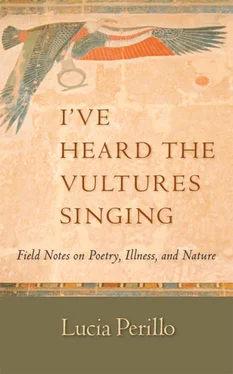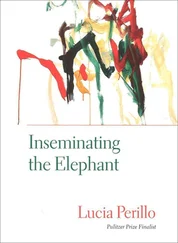How many ever get to this : see how the diseased want to be an exclusive club, a mensa society of fornicators. We think our love takes greater courage, no matter how limp our secret handshake is.
And it occurs to me that someday I will eat these words I’ve written here, because what I know most surely about my erotic life is the fact that it is provisional. My body will have changed by morning — and, in all likelihood, not for the better. And Cupid is a little guy whose energy seems liable to flag as the body starts grinding through the hard work of decay.
Because decay underlies it all, is both the substance of our graves and the loamy below-porch catshit-littered birthplace of the dirigibles (Yeats’s Crazy Jane pops their balloonlike forms when she says: “Love has pitched his mansion in / The place of excrement”). I should also mention the second of Bataille’s great themes: how taboos arise in order that the body’s interior and exterior not be mixed. Blood and feces are not permitted to present themselves in open air, except under controlled and ritualized circumstances. Civilization simply does not function when one loses control of one’s bowels in the big box store (this was not me, by some lucky stroke, though I said to myself You coward when I did not help the woman whose violating of the taboo I had witnessed in Costco; instead, I scuttled away like everyone else, afraid of how wildly, how flagrantly, she had swung an ax at the ice of my human heart).
Fear of the swampy wilderness in the body’s interior is one of the idiosyncrasies of the human species. Wrote the diarist W. N. P. Barbellion in 1915, to show us how contrary the animal kingdom can be on the matter of this taboo:
The vomits of some Owls are formed into shapely pellets, often of beautiful appearance, when composed of the glittering multi-coloured elytra of Beetles, etc. The common Eland is known to micturate [ note : this means pee] on the tuft of hair on the crown of its head, and it does this habitually, when lying down, by bending its head around and down — apparently because of the aroma, perhaps of sexual importance during mating time, as it is a habit of the male alone.
Polite society imagines that the worst part of disability — the real horror of it — comes from how porous disease will make the corporal boundary, and as a result much energy goes into camouflaging the taboo’s breakage. So I hide the bulky package of my disposable underwear underneath the bathroom sink. Once, when giving myself an injection of interferon, I hit a vein by accident and a rooster-tail of blood sprayed across the stark white kitchen. It was obscene but also thrilling, a phenomenon I was familiar with only because I’d read the novels of Denis Johnson. He sums up the taboo in one of the stories in his book, Jesus’ Son : “There’s so much goop inside of us, man. . and it all wants to get out.”
If examined calmly, I can see it’s a needless waste of emotional voltage, the panic roused around the job of hiding the material leakage of the self. The Costco is full of shit, it will not be harmed by more; my dinner may spray from my mouth and my bladder may shudder around what it impounds, but it is still worth that uncontrollable raucous laughter when the right gang is assembled at the table. Jim has a quick wit and so he is especially familiar with all these leaks. The other day we were alone when my nose dripped on my lettuce leaf, and quickly I popped it back into my mouth for a joke — why can’t the fluids return, they’ve only moved an inch, and they might have gone there in a back-sniffle anyway? You’re sick , he pronounced— ha! exactly! It is easy for an invalid to get exhausted by the vigilance — that foremost among our mortal chores should be this job of keeping the goop inside.
When it comes to sex, though, what we want is leakage: for the essence of self to get through to somebody else somehow. And this applies not just to body but to mental essence as well. We want to experience the same ecstatic goop that’s packed inside the person with whom we’re trying to fuse. And we want that essence to be received not in words but in actual feeling , a direct body-to-body download — at least I do. I want my faulty neural circuits to be overridden and overwritten. I want some mental analogue of the copulatory experience of an eland.
The trouble is words, how they remain the barbed-wire fence wrapped around us that we can’t climb: “If someone says to me what he has thought,” writes the philosopher Wittgenstein, “has he really said: what he thought ? Would not the actual mental event have to remain undescribed? — Was it not the secret thing, — of which I give another mere picture in speech?”
Sometimes I too turn into a philosopher when Jim and I go paddling on a river slow enough to leave us no real work to do, and on these afternoons deep in the shade of alder trees I will ask him: “Do I really know you? Do I really know what you think?” On this question, what Wittgenstein has to say is, “‘Why does what is going on in him, in his mind, interest me at all, supposing that something is going on?’ (The devil take what’s going on inside him!)”
The question causes Jim also to turn into a crank: “You’ve known me for twenty years for god’s sake! Of course you know me!” A man who favors action over deliberation, he thinks I invent inane speculations for the purpose of driving him crazy.
And to clarify Jim’s position that started me off— Nobody wants to read about you having sex —I think what he meant was: Why would you speak? In answer, I can only say that a writer will sometimes deign to consider her audience, and it is my belief that people are generally interested in sex, probably even me having it.
This morning is an odd, record-breakingly sultry one in June when the temperature has already topped ninety degrees. So we have driven a few miles, to the tip of the point that sticks into the southern end of Puget Sound. “Nothing is more dreary than a pleasure ground on work days,” wrote the naturalist W. N. P. Barbellion in his journal (the first memoir about living with multiple sclerosis) in 1913. But today the harbor looks more surreal than dreary. Everything appears to be wrapped in plastic, like a sandwich.
To the north you can see the Olympic Mountains, dark blue ribbed with snow. We launch our boat here because the marina has a boat ramp. The boat, being inflatable, could easily be carried anywhere. But because I cannot walk, we need to get the truck close to the water.
The shore here is made of round stones pronged with barnacles. A stretch of muddy sand lies at the shore’s lower reaches — visible at low tide, now. Straight ahead lies Dana Passage, where the current is strong, as we have learned from exhausting ourselves against it. But today we are going to turn left, into the large bay opening to the south, at the bottom of which, ten miles off, you can see the city’s domed capitol and the port’s loading cranes. The morning’s heat has made the water glassy, in the chemical aspect of the word: it looks like melted rock, gray and dense.
The houses here are closely spaced, but when we clear the point the bluff grows steep and becomes unsuitable for development, and so it looks wild, overgrown with Oregon grape and madrona trees. With the annoying piety of those who choose self-propelled forms of travel, we curse the motorboats with their plumes of burnt oil trailing. There is nothing like a jet ski to wreck a fictitious wilderness. We are snobs, and the boat, barely more than a child’s toy, is our high horse.
I have used up much of my life this way, in hours utterly without purpose. My embarkation goes like this: we back down the boat ramp, and Jim unloads the back of our old pickup. While I am reduced to waiting, I try to mitigate my uselessness by telling myself that my job is to observe. A blue heron swallows a fish by undulating its long throat. It regards us with disdain and walks a few steps off on its toy legs, shaggy feathers skirting the top of them like Josephine Baker’s banana outfit.
Читать дальше











![Various - Birds and Nature, Vol. 12 No. 5 [December 1902]](/books/745517/various-birds-and-nature-vol-12-no-5-december-thumb.webp)
![Various - Birds and Nature Vol. 11 No. 2 [February 1902]](/books/745533/various-birds-and-nature-vol-11-no-2-february-1-thumb.webp)